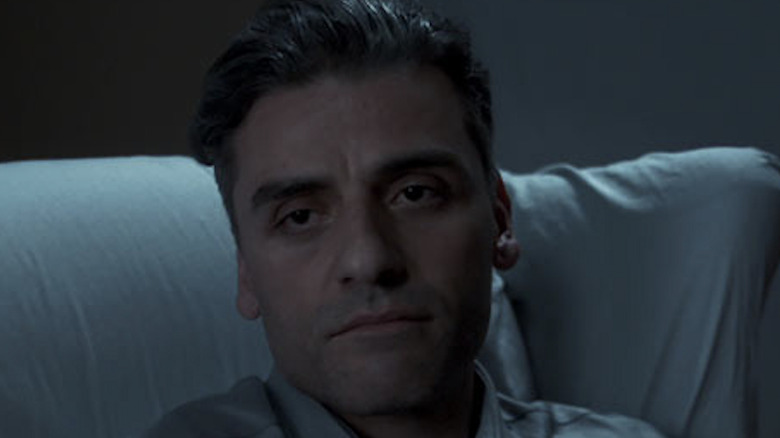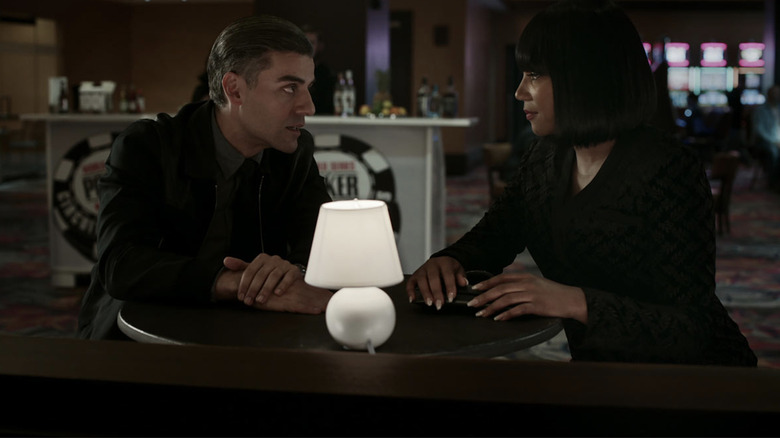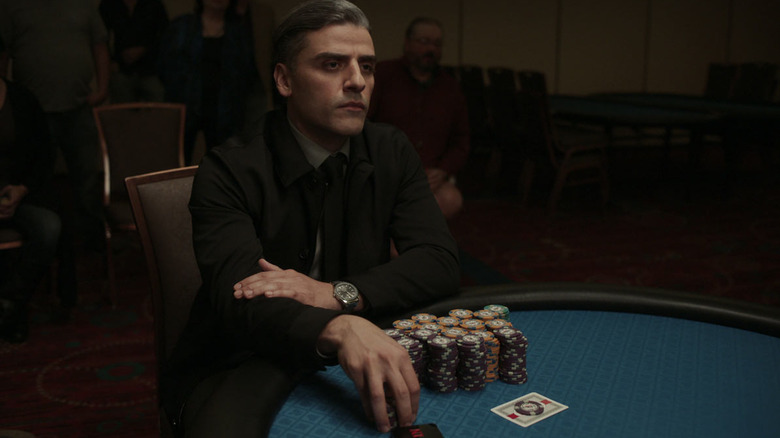The Card Counter Review: A Bad Hand, With An Ace In The Hole
A movie you'll respect more than enjoy, "The Card Counter" features an intense, captivating performance every Oscar Isaac fan needs to experience — and not much more worth recommending. While it's inspiring to see writer/director Paul Schrader still fighting the good fight, so many things that were once revered as hallmarks of a defiant artist — meandering takes, plotlines that go nowhere, a fierce disgust of happy endings — ultimately make this house of cards crumble.
The film casts a haunting spell as it unfurls the tale of William Tell (yes, seriously), a small-time gambler who travels around from casino to casino, making a morose, solitary living playing games of poker, blackjack, perhaps the occasional pai gow. In voiceover, he tells us that he has just concluded a lengthy stay in a military prison — and that he passed the time by teaching himself how to count cards. He also says that as long as he keeps his table time brief and his winnings relatively small, his technically forbidden methods go unpunished.
Tell is approached one evening by "Kirk with a C" (Tye Sheridan), a troubled young man whose father served alongside the card counter. The men were stationed at Abu Ghraib, where they were tasked with extracting information from near-death prisoners in an environment which could be described as a "hellhole" if you wanted to sugarcoat it. There, they were trained by the masochistic Gordo (Willem Dafoe); Cirk's father, we are told, saw and experienced things that would come to tear the family apart and provoke his suicide. Tell was caught up in a Lynndie England-like scandal, where horrifying photos with the inmates leaked to the general public, causing an outrage that resulted in prosecution for those caught on camera. Gordo, their supervisor, walked away unpunished.
Cirk wants vengeance, and imagines Tell as someone who would be sympathetic to his plan to kidnap, torture and kill Gordo. Meanwhile, the film's other storyline has Tell expanding a friendship with La Linda (Tiffany Haddish), a low-level gambling facilitator who oversees a "stable" of card sharks that play with sponsored money. Much of the film comes down to whether Tell will risk his "safe" post-prison existence to accept La Linda's money, set his sights on the World Series of Poker, and win enough money to convince Cirk to reject hate and instead return to school, reunite with his estranged mother, and put his life on a better path.
These characters are orchestrated with nihilistic precision by Schrader, a true Hollywood legend whose pen has given us "Taxi Driver," "Raging Bull," and "American Gigolo," and whose unique vision has had him directing such standouts as "Blue Collar," "Affliction," "Auto Focus," and "First Reformed." A longtime compatriot of Martin Scorsese (who is one of 23 credited executive producers on "Card Counter"), Schrader continues to navigate a fascinating career built on artistic integrity, gritty realism, and exposure of humanity's worst elements. Many have tried to cross Paul Schrader over the years; none have stopped him.
Doubled down on drama
Which feels like it might be part of the problem here. Perhaps somebody could have taken Schrader aside and told him that unnecessarily lengthy takes where Tye Sheridan sits in a chair waiting for someone to come over and talk to him will lull the audience to sleep. Surely, a good collaborator would have pointed out that it's a tedious idea to have the soundtrack for a good third of the film be creepy, Darth Vader-like breathing. Maybe someone on set should have had the guts to explain to the Oscar-nominated screenwriter that his curt dialogue and distinct rhythms don't play well off the tongues of certain actors — resulting in Haddish overcompensating and Sheridan seeming like he's reading lines off a cue card.
Perhaps somebody could have told Schrader that while setting up a USA-embracing card shark in a tank top to be the Apollo Creed of the film — only to abandon the character — is subversive, all that does is waste a whole lot of screentime and anticipation hyping up a showdown that never occurs. Maybe someone could have said that time would be better spent giving the audience any tangible reason to believe La Linda and Tell would fall in love, or Tell would consider throwing his entire life (and an ungodly amount of money) away on a kid who is ungrateful, dim, and aimless.
But hey, this is Paul Schrader, a man who came up alongside Scorsese, Coppola, and De Palma, and still tosses away more good ideas before lunch than most Hollywood screenwriters come up with in a year. There are moments when "Card Counter" dazzles with such inspiration — an early scene that has Isaac explaining how card counting works, another intense moment when Tell sits Cirk down and you aren't sure whether he intends to kill, torture, or inspire the boy — but they are ultimately little more than impressive sprints in a lost marathon. Even at the end of the film, considerable tension is expertly mined — but then Schrader makes one decision after another (off-camera fights, non-verbal reunion scenes) that robs the audience of a satisfying payoff.
But enough about all that, let's instead focus on Oscar Isaac. "The Card Counter" is everything you could want for one of the best actors of his generation: A character unlike any he's played before, whip-smart dialogue that he delivers like a Formula 1 driver matched up with the perfect vehicle, a wide range of complex emotions ranging from self-composure to blind rage, kindness to ruthlessness, simultaneously charming and off-putting, the sense that he's beyond redemption to the sense that he can still find love, do good, and walk away a winner. There's also a brilliant unpredictability to the character — you never know what you're going to get from one scene to the next.
In some ways, Isaac seems to get this character better than Schrader. The performance is pitch-perfect; it's the film that lets William Tell down.
All that, and a bunch of chips
Give a silver medal to Tiffany Haddish, who at the very least brings life to the film by playing against type. But she is nonetheless unable to sell the audience on what her character is saying half the time, whether the lines are complicated gambling speak, flirty dialogue with Isaac, or ill-advised throwaway jokes. The concept of the character is intriguing, Haddish and Isaac seem to genuinely like each other — and that is pretty much every positive thing you can say about the performance.
In many ways, the film is built around Sheridan's character, which is likely why it stumbles. Depending on what the script requires in any given moment, Cirk seems to know nothing about cards, then a little bit, then seems to care about the poker circuit, then seems indifferent to it all. He either doesn't know or care why Tell is going to all this trouble — the performance gives us no indication. At the end of the film, we don't know whether he's going to go straight or carry out his plan for vengeance, which is likely the desired effect, but it is achieved through lack of visible effort rather than any earned ambiguity. Simply put, Oscar Isaac spends the entirety of the film acting circles around everyone.
The frustration is compounded because Schrader shoots the Abu Ghraib scenes powerfully, with a raw intensity and a distinctive flair that can best be described as double-eyed fish lens filth. There's that clever, aforementioned scene early on when card counting is explained — and then the nifty visual is never seen again; in fact, card counting is barely ever mentioned again. The Tell and La Linda characters go on a "date" that is photographed beautifully, but as much emotion as a little hand-holding might give the audience, it sure would have been nice to get some meaningful dialogue as well. Even a scene with Tell confronting a fellow inmate — and then presumably seeking his help — goes nowhere.
If you want a good movie about poker, go track down Robert Altman's "California Split." If you want a good character study about the eccentric men sitting around the table, seek out John Dahl's "Rounders." If you want to watch a great Paul Schrader film, there are plenty of better choices. But perhaps the most frustrating thing about "The Card Counter" is this: If you're looking for an exceptional Oscar Isaac performance, you're gonna need to deal yourself in and just accept the losses.


